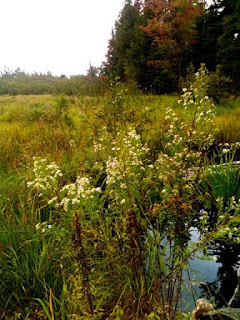From Save the Wild U.P.
This photo shows Wildcat Canyon in the potential CR 595 corridor. The proposed 21-mile primary county road, running north-south between U.S. Highway 41 and County Road Triple A, was intended to connect the Eagle Mine with the Humboldt Mill. (File photo © and courtesy Jeremiah Eagle Eye. Reprinted with permission.)
MARQUETTE -- Grassroots environmental groups including Save the Wild U.P. (SWUP), Concerned Citizens of Big Bay (CCBB), the Yellow Dog Watershed Preserve (YDWP), and other environmental groups are hailing the decision of Federal Judge Robert Holmes Bell, who recently dismissed the Marquette County Road Commission (MCRC) lawsuit against the Environmental Protection Agency (EPA).
In his dismissal, Judge Bell stated that the MCRC "doesn't have a viable claim against the EPA."
From the beginning environmentalists have contended that what the Road Commission wanted to build was an industrial road -- a mining haul road known as CR595 -- but serious threats to wetlands and watersheds proved insurmountable. The proposed road would have cut across 22 rivers and streams, including the Dead River and Yellow Dog River Watersheds, the Mulligan Creek headwaters, Voelker Creek, and Wildcat Canyon. It would also have damaged or destroyed numerous wetlands.
This wetland in the proposed CR 595 corridor is one of many sensitive areas that would be impacted by the proposed wilderness road intended primarily for hauling ore from the Eagle Mine to the Humboldt Mill. (Keweenaw Now file photo © and courtesy Jessica Koski)
Alexandra Maxwell, SWUP’s executive director, applauded Judge Bell
for his decision, adding SWUP hopes this will settle the issue of the
proposed CR595.
"This decision wholly validates what U.P. environmental groups have expressed all along," Maxwell said. "The
EPA’s objections to the construction of this road were valid and
protective of one of the world’s largest sources of freshwater."
On Aug. 28, 2012, a crowd of about 400 filled the Ontario, Michigan and Huron rooms in Northern Michigan University's Don H. Bottum University Center for the Environmental Protection Agency's Public Hearing on the proposed County Road 595. Many residents, tribal representatives and other concerned citizens voiced their objections to the road. In December 2012 EPA objected to the wetland and stream crossing impacts in the permit application and prevented permitting of the road. In January 2015 Marquette County Road Commission voted to sue the EPA. (Keweenaw Now file photo)*
Chauncey Moran, Chairman of the Yellow Dog Watershed Preserve Board of Directors, said, "The 595 issue demonstrates the reason we need clear siting requirements, because there are places where Thou Shalt Not."
During the Aug. 28, 2012, EPA Public Hearing on the proposed County Road 595, Chauncey Moran of Big Bay holds up a photo showing some of the wetlands that could be impacted by the proposed haul road. (Keweenaw Now file photo)
Jon Saari, SWUP vice president, said, "Let's hope Judge Bell's dismissal stands. Big highways are destructive swathes to natural habitats and wildlife. Woods roads are good enough in the UP backcountry."
Gene Champagne, spokesperson for Concerned Citizens of Big Bay, said the MCRC has wasted energy on a fraudulent application for this road.
"Moving forward, the MCRC needs to 'Quit Whining, Drop the Lawsuit, and Fix Our Roads.'"
During their Jan. 19, 2015, meeting, members of the Marquette County Road Commission return from a closed session discussion of their proposed lawsuit against the Environmental Protection Agency. (File photo by Gene Champagne for Keweenaw Now)
Champagne noted the judge's decision received little coverage in the mainstream media.
"If the decision had gone the other way it would BIG news!!! The
mainstream media must be getting or giving some of that 'dark money,'" Champagne said.
Jeffery Loman, Keweenaw Bay Indian Community tribal member and former federal oil regulator, said, "It should be clear to everyone now -- the Rio Tinto 'Woodland Road' proposal and MCRC’s subsequent CR-595 proposal didn't meet even the minimum requirements under the Clean Water Act. Their efforts to subvert our laws didn't work."
According to concerned citizen Catherine Parker, who has attended most Marquette County Road Commission meetings and followed federal objections to the proposed road, "MCRC doesn't have a case. Period. The evidence is right there in the files I received through Freedom of Information Act requests."
Horst Schmidt, Upper Peninsula Environmental Coalition (UPEC) president, said the UPEC Board has authorized the following statement:
"The court’s decision promotes sound land stewardship by preserving the unique natural resources, including the wetlands and wildlife habitat along the proposed CR 595 corridor. The Upper Peninsula Environmental Coalition acknowledges the persistent efforts of SWUP in supporting the EPA's original decision along with the diverse group of local citizens, businesses and other organizations that rallied behind SWUP and the EPA in support of the rule of law designed to protect our people and our fragile environment here in the U.P."
Kathleen Heideman, SWUP president, said Judge Bell made the right decision.
"The facts never supported the Road Commission’s claims," Heideman noted.
Keweenaw Now attempted to contact the Marquette County Road Commission Thursday and learned their office is closed until Monday, June 20, for "staff training." We also tried to reach individual MCRC Board members today, but were not able to contact them.
A short article on TV-6 News Thursday evening (June 16) states that MCRC is asking Judge Bell to reconsider his decision.**
Editor's Notes:
* See our two-part article on the Aug. 28, 2012, EPA Public Hearing on CR595: "EPA Hearing on CR 595 permit: Part 1, Questions" and "EPA Hearing on CR 595: Part 2: Comments."
** Click here for the TV-6 article and video clip.
Subscribe to:
Post Comments (Atom)








































































































































No comments:
Post a Comment